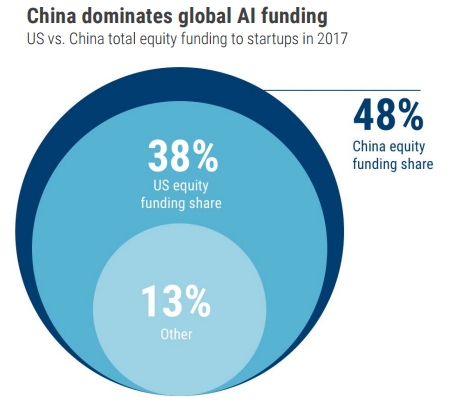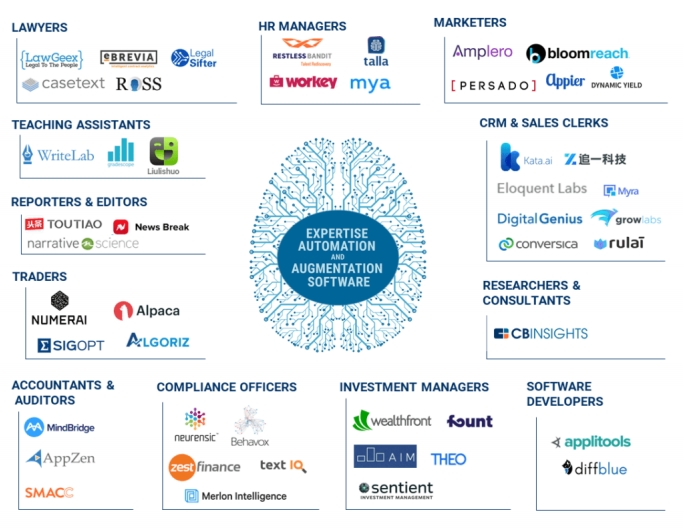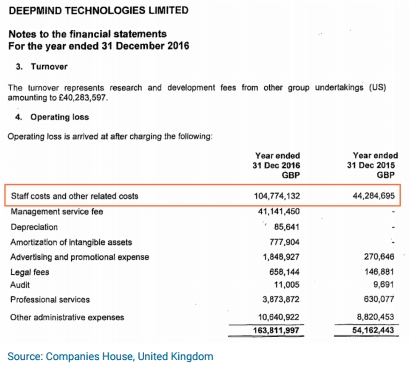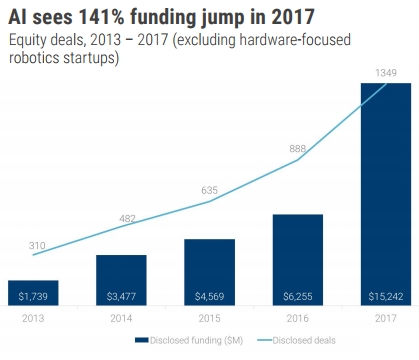Is AI a millionaire profession?
- Transfer
In October, CB Insights analytical platform published a study on trends in artificial intelligence. CB Insights itself is a participant in this area - the company uses AI for the synthesis, analysis and visualization of data on venture capital, start-ups, patents, partnerships and news. Its clients include Cisco, Salesforce, Castrol, Gartner, and top-class venture funds, including NEA, Upfront Ventures, RRE, and FirstMark Capital.
We offer to get acquainted with the five most interesting and important trends in AI, which the platform has made on the basis of data for 2016-2017.

In all areas, the volume of transactions related to AI has grown over the past 5 years.
China confidently and very aggressively fulfills its plan to capture the AI market. Last year, the Chinese venture capital market surpassed the American market for the first time: half of all investments in AI startups in 2017 were made by Chinese companies.

Undoubtedly, the United States still dominates the number of AI projects in the world, but they are gradually losing their global share of transactions.
In China, the focus is on two developments: face recognition technology and AI chips .
There are now three leaders in the Chinese face recognition system: Megvii and SenseTime, two unicorns, and a new startup, CloudWalk, which received a grant of $ 301 million from the government.
In 2017, 55 cities in China became the targets of the big brother. Cameras monitor people and events, and the captured images are processed in state institutions. Ultimately, this should lead to the creation of a social credit system - a kind of metric for assessing citizens.
[Note: the full “social rating” in China is planned to be implemented by 2020. A system with built-in AI will determine this indicator, tracking a person’s behavior: what he spends money on, whether he pays bills regularly, whether he is friendly with people. Those who do not reach the required level of trust will not be able to leave the country or use certain government services.]
Startup Megvii has already gained access to data on Chinese citizens, as well as support from the insurance company Sunshine Insurance Group, the Russian-China Investment Fund and corporate giants Foxconn and Ant Financial. The latter joined the “City Brain” project in Hangzhou and use AI to analyze camera data.
In addition to government projects, Ant Financial uses a face recognition system for commercial purposes - for example, they implemented the development of a payment system for retail stores owned by Alibaba.
As for the AI chips, Chinese developers are now working on a device that is 20 times greater than the performance and energy efficiency of NVIDIA GPUs. In the next three years, the Chinese company Cambricon will be engaged in the development of chips specifically for deep learning.
China is loyal in investment issues - its main technology giants Baidu and JD invest in both Chinese AI start-ups and foreign ones. So, recently Baidu and JD financed a machine learning startup ZestFinance, and Tencent supported the NYEN project, which operates on the basis of Oben. At the same time, some startups, such as WuXi NextCODE and Pony.ai, work with both China and the United States. This blurs competitive boundaries even more.
Lawyers, financiers, traders and other representatives of high-paying professions will increasingly encounter AI.
For example, it will be useful in legal work. Natural language processing tools are capable of analyzing thousands of legal documents in minutes.
Programmers are also not protected from AI interference in their activities. Many start-up IT startups are now focused on testing, debugging and basic development of interfaces based on AI. So, last year, one of the best seed rounds of financing was held by the British startup DiffBlue, which is developing AI for automating traditional coding tasks and translating code from one programming language to another.
But health care and education are considered the least susceptible to automation. The researchers argue that this is due to the dynamism and heterogeneity of the problems solved in these areas. Weak artificial intelligence is not yet capable of this.

Examples of existing proposals for the automation of white-collar work
Against the backdrop of a technological race, the war for talents is becoming more fierce - especially given the fact that the demand for AI developers exceeds their number. The best industry professionals can now earn millions of dollars. Including thanks to China.
The salary of a senior AI researcher in China is $ 567-624 thousand per year, while ML experts in other countries earn $ 315-410 thousand during the same period of time.
According to a recent report by Tencent, the estimated number of employed artificial intelligence specialists in China is 300,000. But this is still not enough - companies may need a million or even more AI specialists.
The US hiring market is also not empty. On Glassdoor - the American site for anonymous viewing of vacancies and resumes - in the “artificial intelligence” section there are more than 32,000 positions, sometimes with salaries with six-digit figures.
Deepmind Technologies in its financial report for 2016 reported that their staff costs amounted to 104.8 million pounds. Judging by the profiles of the company's employees in LinkedIn, we can assume that there are 415 employees in Deepmind Technologies. Considering that this is the entire amount of spending on teams, it can be assumed that the average salary of an employee of Deepmind Technologies is about $ 350 thousand a year.

The peak of the popularity of machine learning was in 2017. Then, only in incubators there were more than 300 AI startups - three times more than in 2016. Since 2016, more than 1,100 new companies conducted the first rounds of financing - and this is more than half of the AI start-ups that went into the investment stages for all previous years.

Now machine learning is certainly popular - but the HYIP around it will soon die.
The huge choice will make investors picky about AI startups. According to Frank Chen from the Andreessen Horowitz Venture Fund, “in a few years, not a single investor will look for AI startups.” Already, the best investors carefully evaluate them. For example, before supporting the diagnostic startup Freenome, investors Andreessen Horowitz sent them 5 unmarked blood test tubes. So they wanted to make sure that the company effectively uses its algorithms for analyzing samples. By the way, the company has passed the test.
Previous trends - a shortage of personnel, the introduction of new developments and increased requirements for start-ups - have provoked the emergence of new educational platforms.
Thanks to open source software libraries, hundreds of APIs and SDKs and Amazon and Google kits, learning this specialty is much easier than ever before.
For example, Google launched an open source artificial intelligence project called AIY - Artificial Intelligence Yourself. Specialists of any age and level of knowledge can take courses. Amazon encourages developers to develop on their own - the company offers $ 7,500 to the winners of the first DeepLens hackathon to develop machine-based projects.
In November, Smile Expo organizes two conferences on the use of artificial intelligence.
AI Conference Kyiv , November 14
This is a conference on artificial intelligence, IoT and chat bots.
Main themes:
Speakers include representatives of Skylum Software , Kyivstar, Ukrgasbank, METRO Cash & Carry Ukraine and others.
AI Conference in Moscow , November 22 The
conference is dedicated to artificial intelligence, Big Data, machine learning, chat bots and information security .
Among the speakers are representatives of NVIDIA, Microsoft, X5 Retail Group, CleverDATA, Yandex and others.
We offer to get acquainted with the five most interesting and important trends in AI, which the platform has made on the basis of data for 2016-2017.

In all areas, the volume of transactions related to AI has grown over the past 5 years.
China is advancing the US on the heels
China confidently and very aggressively fulfills its plan to capture the AI market. Last year, the Chinese venture capital market surpassed the American market for the first time: half of all investments in AI startups in 2017 were made by Chinese companies.

Undoubtedly, the United States still dominates the number of AI projects in the world, but they are gradually losing their global share of transactions.
In China, the focus is on two developments: face recognition technology and AI chips .
There are now three leaders in the Chinese face recognition system: Megvii and SenseTime, two unicorns, and a new startup, CloudWalk, which received a grant of $ 301 million from the government.
In 2017, 55 cities in China became the targets of the big brother. Cameras monitor people and events, and the captured images are processed in state institutions. Ultimately, this should lead to the creation of a social credit system - a kind of metric for assessing citizens.
[Note: the full “social rating” in China is planned to be implemented by 2020. A system with built-in AI will determine this indicator, tracking a person’s behavior: what he spends money on, whether he pays bills regularly, whether he is friendly with people. Those who do not reach the required level of trust will not be able to leave the country or use certain government services.]
Startup Megvii has already gained access to data on Chinese citizens, as well as support from the insurance company Sunshine Insurance Group, the Russian-China Investment Fund and corporate giants Foxconn and Ant Financial. The latter joined the “City Brain” project in Hangzhou and use AI to analyze camera data.
In addition to government projects, Ant Financial uses a face recognition system for commercial purposes - for example, they implemented the development of a payment system for retail stores owned by Alibaba.
As for the AI chips, Chinese developers are now working on a device that is 20 times greater than the performance and energy efficiency of NVIDIA GPUs. In the next three years, the Chinese company Cambricon will be engaged in the development of chips specifically for deep learning.
China is loyal in investment issues - its main technology giants Baidu and JD invest in both Chinese AI start-ups and foreign ones. So, recently Baidu and JD financed a machine learning startup ZestFinance, and Tencent supported the NYEN project, which operates on the basis of Oben. At the same time, some startups, such as WuXi NextCODE and Pony.ai, work with both China and the United States. This blurs competitive boundaries even more.
Automation of the "white collar"
Lawyers, financiers, traders and other representatives of high-paying professions will increasingly encounter AI.
For example, it will be useful in legal work. Natural language processing tools are capable of analyzing thousands of legal documents in minutes.
Programmers are also not protected from AI interference in their activities. Many start-up IT startups are now focused on testing, debugging and basic development of interfaces based on AI. So, last year, one of the best seed rounds of financing was held by the British startup DiffBlue, which is developing AI for automating traditional coding tasks and translating code from one programming language to another.
But health care and education are considered the least susceptible to automation. The researchers argue that this is due to the dynamism and heterogeneity of the problems solved in these areas. Weak artificial intelligence is not yet capable of this.

Examples of existing proposals for the automation of white-collar work
Companies pay AI developers six times more than other professionals.
Against the backdrop of a technological race, the war for talents is becoming more fierce - especially given the fact that the demand for AI developers exceeds their number. The best industry professionals can now earn millions of dollars. Including thanks to China.
The salary of a senior AI researcher in China is $ 567-624 thousand per year, while ML experts in other countries earn $ 315-410 thousand during the same period of time.
According to a recent report by Tencent, the estimated number of employed artificial intelligence specialists in China is 300,000. But this is still not enough - companies may need a million or even more AI specialists.
The US hiring market is also not empty. On Glassdoor - the American site for anonymous viewing of vacancies and resumes - in the “artificial intelligence” section there are more than 32,000 positions, sometimes with salaries with six-digit figures.
Deepmind Technologies in its financial report for 2016 reported that their staff costs amounted to 104.8 million pounds. Judging by the profiles of the company's employees in LinkedIn, we can assume that there are 415 employees in Deepmind Technologies. Considering that this is the entire amount of spending on teams, it can be assumed that the average salary of an employee of Deepmind Technologies is about $ 350 thousand a year.

HYIP around machine learning will die soon
The peak of the popularity of machine learning was in 2017. Then, only in incubators there were more than 300 AI startups - three times more than in 2016. Since 2016, more than 1,100 new companies conducted the first rounds of financing - and this is more than half of the AI start-ups that went into the investment stages for all previous years.

Now machine learning is certainly popular - but the HYIP around it will soon die.
The huge choice will make investors picky about AI startups. According to Frank Chen from the Andreessen Horowitz Venture Fund, “in a few years, not a single investor will look for AI startups.” Already, the best investors carefully evaluate them. For example, before supporting the diagnostic startup Freenome, investors Andreessen Horowitz sent them 5 unmarked blood test tubes. So they wanted to make sure that the company effectively uses its algorithms for analyzing samples. By the way, the company has passed the test.
DIY AI
Previous trends - a shortage of personnel, the introduction of new developments and increased requirements for start-ups - have provoked the emergence of new educational platforms.
Thanks to open source software libraries, hundreds of APIs and SDKs and Amazon and Google kits, learning this specialty is much easier than ever before.
For example, Google launched an open source artificial intelligence project called AIY - Artificial Intelligence Yourself. Specialists of any age and level of knowledge can take courses. Amazon encourages developers to develop on their own - the company offers $ 7,500 to the winners of the first DeepLens hackathon to develop machine-based projects.
In November, Smile Expo organizes two conferences on the use of artificial intelligence.
AI Conference Kyiv , November 14
This is a conference on artificial intelligence, IoT and chat bots.
Main themes:
- increased sales using MO;
- operator role in the development of IoT;
- chat bots - use in state and commercial companies.
Speakers include representatives of Skylum Software , Kyivstar, Ukrgasbank, METRO Cash & Carry Ukraine and others.
AI Conference in Moscow , November 22 The
conference is dedicated to artificial intelligence, Big Data, machine learning, chat bots and information security .
Among the speakers are representatives of NVIDIA, Microsoft, X5 Retail Group, CleverDATA, Yandex and others.
